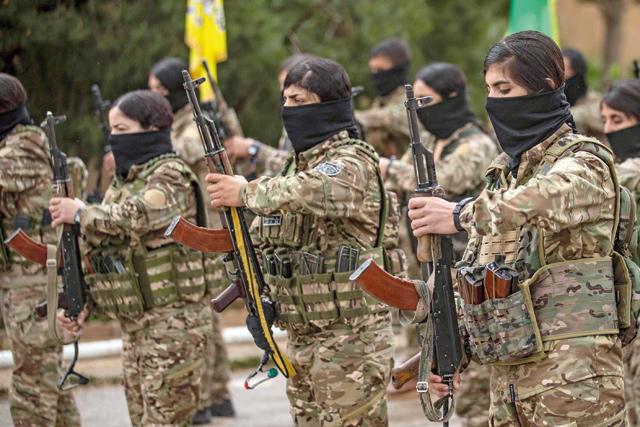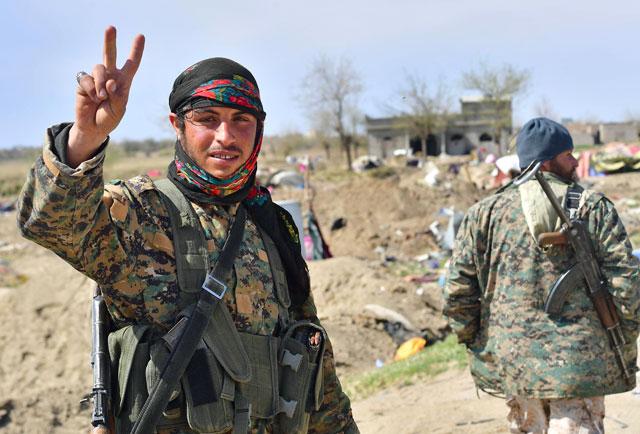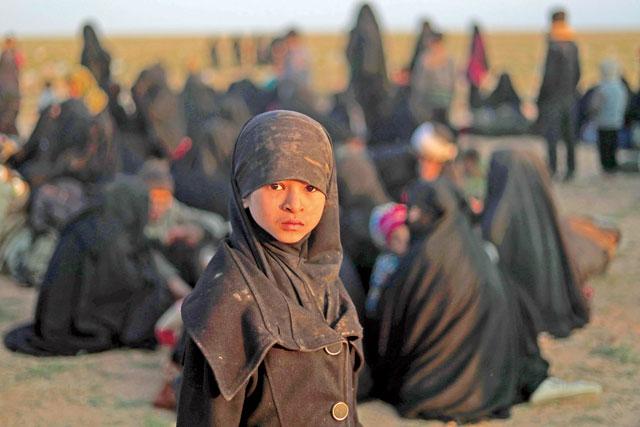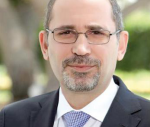You are here
Two years after defeat, Daesh just as dangerous, Kurds warn
Mar 23,2021 - Last updated at Mar 23,2021

Fighters of the Kurdish-led Syrian Democratic Forces (SDF) take part in a military parade in the US-protected Al Omar oil field in the eastern province of Deir Ezzor on Tuesday, marking the second annual anniversary of Baghouz’s liberation from the Daesh group (AFP photo)
By Delil Soleiman
Agence France-Presse
AL OMAR, Syria — Daesh forces remain as dangerous today as when they were ousted from their last Syrian bastion two years ago, Kurdish forces warned on Tuesday as they marked the anniversary.
The Kurdish-led Syrian Democratic Forces (SDF) said counter-terrorism efforts today were “more difficult than face-to-face fighting with terrorists, and are considered more dangerous”, in a statement to mark their victory in March 2019.
“The fall of the last patch of Daesh territory in northeast Syria does not mean complete defeat,” the SDF added.
On Tuesday, Kurdish authorities, local tribal leaders and members of the US-led coalition who pushed Daesh from their Syrian stronghold, marked the anniversary with a military parade in the US-protected Al Omar oil field, in the eastern province of Deir Ezzor.
The Daesh defeat in the eastern riverside hamlet of Baghouz marked the end of a cross-border “caliphate” declared in 2014 across swaths of Iraq and Syria.
But two years on, Daesh has shown that it does not need a stronghold to pose a potent threat, with the militants carrying out regular attacks and ambushes, including setting off roadside bombs and machine-gunning vehicles.
They are also feared to be recruiting fresh fighters, including among tens of thousands of suspected Daesh relatives detained in overcrowded displacement camps.
“We are currently at the most difficult stage of our counterterrorism efforts,” the SDF added.
‘Safe haven’
Daesh retains some 10,000 active fighters in both Syria and Iraq, although the majority are reported to be in Iraq, the United Nations said in a recent report.
Syria’s vast desert near the Iraqi border has emerged as a key “safe haven” for Daesh operatives and a springboard for attacks, the UN said.
The Daesh group is “building and retaining a cellular structure which allows it to carry out terrorist attacks”, General Kenneth McKenzie, head of the US Central Command that oversees troops deployed in Afghanistan, Iraq and Syria, said last month.
At Al Omar, SDF banners were raised to mark the anniversary, alongside posters carrying pictures of fighters killed during the years-long battle against militants.
Fighters in fatigues marched in a show of strength.
“In the spirit of the liberation of Baghouz... we will liberate all our lands,” one poster read, referring to the village where Daesh made its last stand.
Kurdish fighters joined ranks with Arab forces to form the US-backed SDF alliance in 2015.
They would go on to oust Daesh from key areas, including their de facto capital Raqqa in 2017.
In October 2019, a US strike on Syria killed Daesh leader Abu Bakr Al Baghdadi and several other prominent figures.
But Baghdadi’s successor, Mohammed Said Abd Al Rahman Al Mawla, has been able to direct and inspire new attacks.
Danger ‘lives on’
The tens of thousands of extremists in Kurdish jails and suspected Daesh relatives held in displacement camps have emerged as an extremist powder keg.
Syria’s Kurds hold nearly 43,000 foreigners with links to the jihadist group in jails and informal displacement camps, Human Rights Watch (HRW) said on Tuesday.
They include 27,500 children, at least 300 of whom are in squalid prisons, while the rest are kept in rehabilitation centres or locked camps, HRW said.
Repeated calls for Western countries to repatriate their nationals have largely fallen on deaf ears, with just a handful of children and a few women being brought home.
“Men, women, and children from around the world are entering a third year of unlawful detention in life-threatening conditions... while their governments look the other way,” HRW’s Letta Tayler said.
The SDF reiterated calls on Tuesday for countries to boost repatriation efforts, and establish international tribunals to prosecute those in detention accused of being terrorists.
Most suspected Daesh relatives are being kept in the Al Hol camp, the largest of the settlements controlled by Kurdish authorities.
Al Hol holds almost 62,000 people, mostly women and children, including Syrians, Iraqis and thousands from Europe and Asia accused of family ties with IS fighters.
Some detainees see the camp as the last vestige of the cross-border “caliphate”.
“The danger of the Daesh group lives on in the thousands of prisoners held in jails as well as... their relatives detained in camps,” the SDF added.
In a report published last month, the UN said it had documented instances of “radicalisation, fundraising, training and incitement of external operations” at Al Hol.
It also warned of the fate of around 7,000 children living in a special annex designated for foreign Daesh relatives.
They are “being groomed as future ISIL operatives” the UN said.
Related Articles
BAGHOUZ, Syria — Kurdish-led forces pronounced the death of the Daesh group's nearly five-year-old "caliphate" Saturday after flushing out d
BEIRUT — Kurdish forces made dozens of arrests in a security operation launched Sunday in a camp for suspected family members of the Daesh t
NEAR BAGHOUZ, Syria — US-backed forces evacuated over 40 truckloads of people from the Daesh group's last Syria redoubt on Monday, as they s

















